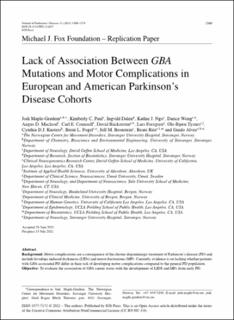| dc.contributor.author | Grødem, Jodi Maple | |
| dc.contributor.author | Paul, Kimberly C. | |
| dc.contributor.author | Dalen, Ingvild | |
| dc.contributor.author | Ngo, Kathie J. | |
| dc.contributor.author | Wong, Darice | |
| dc.contributor.author | Macleod, Angus D. | |
| dc.contributor.author | Counsell, Carl E. | |
| dc.contributor.author | Bäckström, David | |
| dc.contributor.author | Forsgren, Lars | |
| dc.contributor.author | Tysnes, Ole-Bjørn | |
| dc.contributor.author | Kusters, Cynthia D.J. | |
| dc.contributor.author | Fogel, Brent L. | |
| dc.contributor.author | Bronstein, Jeff M. | |
| dc.contributor.author | Ritz, Beate | |
| dc.contributor.author | Alves, Guido Werner | |
| dc.date.accessioned | 2021-10-21T11:29:09Z | |
| dc.date.available | 2021-10-21T11:29:09Z | |
| dc.date.created | 2021-08-20T10:58:49Z | |
| dc.date.issued | 2021 | |
| dc.identifier.issn | 1877-7171 | |
| dc.identifier.uri | https://hdl.handle.net/11250/2824483 | |
| dc.description.abstract | Background:
Motor complications are a consequence of the chronic dopaminergic treatment of Parkinson’s disease (PD) and include levodopa-induced dyskinesia (LIDs) and motor fluctuations (MF). Currently, evidence is on lacking whether patients with GBA-associated PD differ in their risk of developing motor complications compared to the general PD population.
Objective:
To evaluate the association of GBA carrier status with the development of LIDS and MFs from early PD.
Methods:
Motor complications were recorded prospectively in 884 patients with PD from four longitudinal cohorts using part IV of the UPDRS or MDS-UPDRS. Subjects were followed for up to 11 years and the associations of GBA mutations with the development of motor complications were assessed using parametric accelerated failure time models.
Results:
In 439 patients from Europe, GBA mutations were detected in 53 (12.1%) patients and a total of 168 cases of LIDs and 258 cases of MF were observed. GBA carrier status was not associated with the time to develop LIDs (HR 0.78, 95%CI 0.47 to 1.26, p = 0.30) or MF (HR 1.19, 95%CI 0.84 to 1.70, p = 0.33). In the American cohorts, GBA mutations were detected in 36 (8.1%) patients and GBA carrier status was also not associated with the progression to LIDs (HR 1.08, 95%CI 0.55 to 2.14, p = 0.82) or MF (HR 1.22, 95%CI 0.74 to 2.04, p = 0.43).
Conclusion:
This study does not provide evidence that GBA-carrier status is associated with a higher risk of developing motor complications. Publication of studies with null results is vital to develop an accurate summary of the clinical features that impact patients with GBA-associated PD. | en_US |
| dc.language.iso | eng | en_US |
| dc.publisher | IOS Press | en_US |
| dc.rights | Navngivelse-Ikkekommersiell 4.0 Internasjonal | * |
| dc.rights.uri | http://creativecommons.org/licenses/by-nc/4.0/deed.no | * |
| dc.title | Lack of Association Between GBA Mutations and Motor Complications in European and American Parkinson’s Disease Cohorts | en_US |
| dc.type | Journal article | en_US |
| dc.type | Peer reviewed | en_US |
| dc.description.version | publishedVersion | en_US |
| dc.rights.holder | Copyright 2021 – The authors | en_US |
| cristin.ispublished | true | |
| cristin.fulltext | original | |
| cristin.qualitycode | 1 | |
| dc.identifier.doi | 10.3233/JPD-212657 | |
| dc.identifier.cristin | 1927582 | |
| dc.source.journal | Journal of Parkinson's Disease | en_US |
| dc.source.pagenumber | 1569-1578 | en_US |
| dc.relation.project | Norges forskningsråd: 287842 | en_US |
| dc.identifier.citation | Journal of Parkinson's Disease. 2021, 11 (4), 1569-1578. | en_US |
| dc.source.volume | 11 | en_US |
| dc.source.issue | 4 | en_US |

